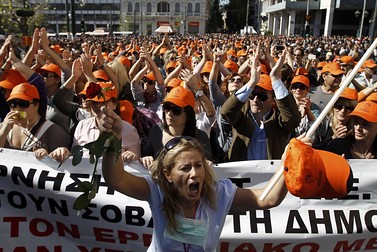By Polya Lesova, MarketWatch
LONDON (MarketWatch) — Normal life in Greece was once again disrupted Wednesday, as tens of thousands joined a 48-hour general strike to protest the latest round of austerity measures as the nation teeters on the brink of default.
The strike, organized by Greece’s two big unions representing both public- and private-sector workers, is the latest in a multitude of demonstrations to hit the debt-laden country in recent months.
The protests underscore the level of public frustration with the cost-cutting measures the government has taken in an attempt to reduce Greece’s deficit and keep receiving financial aid from international lenders, as the local economy remains mired in a severe recession.
Government offices, along with businesses and shops, were closed Wednesday, while public-transportation services weren’t working, according to media reports.
Air-traffic controllers also walked off the job for 12 hours, grounding flights.
The BBC, citing police, reported that more than 70,000 people took part in demonstrations in central Athens.
Against this backdrop, the Greek parliament is expected Thursday to vote on a package of austerity measures demanded by the International Monetary Fund and the European Union in exchange for releasing an 8 billion euro ($11 billion) aid tranche. Greece desperately needs the aid if it is to avoid a near-term default on its debt obligations.
Greece’s troika of international lenders — the IMF, European Central Bank and European Commission — said earlier in October that the nation won’t be able to meet its 2011 fiscal target due to the deeper-than-anticipated recession and slippages in the implementation of some measures. The troika also noted that additional measures will be needed to meet goals in 2013 and 2014.
The government of Prime Minister George Papandreou, which has a four-seat majority in the 300-member parliament, faces a test on Thursday.
“Our baseline scenario remains that the government will succeed in securing the required majority for the approval of the aforementioned bill, but clearly the vote will be tight and last-minute defections from PASOK ranks cannot be ruled out,” said Wolfango Piccoli, an analyst at political-risk consultancy Eurasia Group, in a note.
The Greek parliamentary vote will come ahead of a summit of European Union leaders in Brussels on Sunday where they are expected to present a plan to tackle the sovereign debt crisis.
Meanwhile, a survey showed that an overwhelming majority of global investors expect the Greek government to default on its debt obligations.
Ninety-two percent of the 199 respondents to the Bank of America Merrill Lynch fund managers’ survey believe that Greece cannot avoid default. Seven out of 10 respondents expect a default by April 2012, according to the survey, which was released Wednesday.
“The survey shows investor consensus has priced in, or hopes for, an orderly default by Greece,” said Michael Hartnett, chief global equities strategist at BofA Merrill Lynch Research, in a statement.
Polya Lesova is chief of MarketWatch’s London bureau.



















